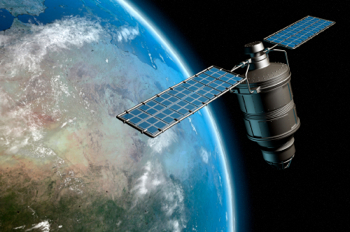Space collision takes out Iridium satellite
Two satellites have collided in space in what’s believed to be the first accident of its kind between man-made objects.


A defunct Russian satellite and an active communications satellite owned by Iridium have crashed into each other in space, releasing thousands of pieces of potentially dangerous debris into orbit.
AFP has reported that he incident was confirmed by Major General Alexander Yakushin, the head of the Russian space industry who said: "A collision occurred between an Iridium 33 satellite and a Russian Kosmos 2251 military satellite."
Iridium has already denied that it was at fault for the incident and in a statement described it as a, "extremely unusual, very low-probability event".
The Iridium satellite was one of 66 orbiting the earth, provide mobile phone communications but the company said that its services would not be affected as it "is uniquely designed to withstand such an event, and the company is taking the necessary steps to replace the lost satellite with one of its in-orbit spare satellites."
The incident occurred approximately 500 miles above Siberia, and above the orbit of the International Space Station. However, NASA has already said that it does not believe the incident poses any risk to the ISS and does not believe it will delay the launch of the Discovery space shuttle flight that's scheduled for 22 February.
While space detritus does collide occasionally, it is the first time that two satellites have crashed. "We knew this was going to happen eventually," Mark Matney, an orbital debris scientist at Johnson Space Center in Houston is reported to have said.
Get the ITPro daily newsletter
Sign up today and you will receive a free copy of our Future Focus 2025 report - the leading guidance on AI, cybersecurity and other IT challenges as per 700+ senior executives
Benny Har-Even is a twenty-year stalwart of technology journalism who is passionate about all areas of the industry, but telecoms and mobile and home entertainment are among his chief interests. He has written for many of the leading tech publications in the UK, such as PC Pro and Wired, and previously held the position of technology editor at ITPro before regularly contributing as a freelancer.
Known affectionately as a ‘geek’ to his friends, his passion has seen him land opportunities to speak about technology on BBC television broadcasts, as well as a number of speaking engagements at industry events.
-
 Cleo attack victim list grows as Hertz confirms customer data stolen
Cleo attack victim list grows as Hertz confirms customer data stolenNews Hertz has confirmed it suffered a data breach as a result of the Cleo zero-day vulnerability in late 2024, with the car rental giant warning that customer data was stolen.
By Ross Kelly
-
 Lateral moves in tech: Why leaders should support employee mobility
Lateral moves in tech: Why leaders should support employee mobilityIn-depth Encouraging staff to switch roles can have long-term benefits for skills in the tech sector
By Keri Allan